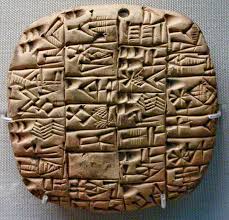cuneiform
英 ['kjuːnɪfɔːm; kjuː'neɪɪfɔːm]
美 ['kjʊnɪə,fɔrm]
- adj. 楔形的;楔形文字的;楔状骨的
- n. 楔形文字;楔状骨
- cuneiform (adj.)
- 1670s, "wedge shaped," from French cunéiforme (16c.), from Latin cuneus "a wedge, wedge-shaped thing," which is of unknown origin, + French -forme (see form (n.)). Applied to characters in ancient Middle Eastern inscriptions made with wedge-shaped writing tools; first used in this sense by German physician and traveler Engelbert Kämpfer (1681-1716); in English from 1818. As a noun from 1862.
- 1. The cuneiform script is a great invention by the Sumerians.
- 楔形文字是苏美尔人的一大发明.
来自互联网
- 2. B.C. Cuneiform first used by Sumerians in present - day Iraq for economic records.
- 公元前3500年,生活在现在伊拉克地区的闪族人首先使用楔形文字记录经济活动.
来自互联网
- 3. With the cultural dissemination, other ethnic groups in west Asia and southwest Asia adopted cuneiform.
- 楔形文字传播的地区主要在西亚和西南亚.
来自互联网
[ cuneiform 造句 ]
